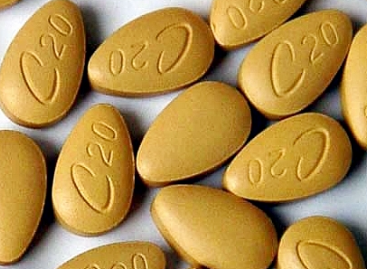Index
Introduction
What is Tadalafil and What is it Used For?
Tadalafil is an oral medication widely used to treat erectile dysfunction (ED) in men, also known as impotence. Belonging to the class of phosphodiesterase type 5 (PDE5) inhibitors, tadalafil works by increasing blood flow to the penis, making it easier to achieve and maintain an erection during sexual stimulation. Additionally, tadalafil is also used in the treatment of benign prostatic hyperplasia (BPH) and, in some cases, pulmonary arterial hypertension (PAH).
Why Knowing the Side Effects is Important?
Like any medication, tadalafil can cause side effects in some people. Being aware of possible side effects is crucial for ensuring the safe and effective use of the medication. Knowing the symptoms and warning signs allows you to take appropriate measures to manage or avoid unwanted complications. Additionally, it’s important to remember that not all side effects are the same, and some may be more serious than others, requiring immediate medical attention.
Understanding Common and Rare Side Effects
The side effects of tadalafil can range from mild to severe and from common to rare. Common side effects are generally mild and temporary, disappearing as the body adjusts to the medication. However, rare but serious side effects can occur and require immediate medical intervention. Throughout this article, we will discuss in detail the common and rare side effects associated with the use of tadalafil, as well as the precautions and measures to be taken.
The Importance of Medical Consultation
Although this article is a comprehensive guide on the side effects of tadalafil, it’s important to remember that each person is unique and may react differently to the medication. Therefore, it is essential to consult with your doctor before starting treatment with tadalafil. Your doctor can evaluate your health condition, medical history, and medications in use to determine if tadalafil is the most suitable option for you and, if necessary, adjust the dosage according to your specific needs.
Reliable and Updated Information
To ensure that you are well-informed about the side effects of tadalafil, it’s important to seek information from reliable and updated sources. This article has been prepared based on current studies and medical guidelines and contains relevant and accurate information on the subject. However, it’s essential to be aware that new research and updates may emerge, and it is always advisable to check the most recent information available before making decisions related to your health.
Side Effects of Tadalafil
Description of Most Common Side Effects
The common side effects of tadalafil are generally considered mild and temporary. They may include:
- Headache: One of the most frequently reported side effects by patients, often due to increased blood flow caused by the action of tadalafil.
- Indigestion or Stomach Discomfort: Some people may experience nausea, heartburn, or mild abdominal discomfort after taking tadalafil.
- Back Pain: Back pain is another common side effect, although the exact cause is not clear. It may be the result of an increase in blood flow to the muscles in the back.
- Muscle Pain: Similar to back pain, muscle pain can also be a common side effect and may be the result of increased blood flow to the muscles.
- Facial Flushing: Facial flushing, or redness in the face, may occur due to increased blood flow in the facial blood vessels.
- Nasal Congestion: Nasal congestion is another common side effect and may be caused by the vasodilating action of tadalafil, which affects blood vessels in the nose.
Frequency and Duration of These Effects
The frequency and duration of tadalafil’s common side effects vary among patients. Some people may not experience any side effects, while others may experience one or more. Generally, these side effects are temporary and fade as the body adjusts to the medication. However, they may persist for a few hours to a few days after taking tadalafil.
To give a general estimate of the frequency of common side effects:
- Headache: Approximately 10-15% of patients may experience a headache when taking tadalafil.
- Indigestion or Stomach Discomfort: About 5-10% of patients may experience these symptoms.
- Back Pain: Approximately 3-6% of patients report back pain.
- Muscle Pain: About 2-4% of patients may experience muscle pain.
- Facial Flushing: Approximately 3-8% of patients may experience facial flushing.
- Nasal Congestion: About 2-4% of patients may suffer from nasal congestion.
Although these side effects are common, it’s important to remember that each person is unique and may react differently to the medication. If the side effects persist for an extended period, worsen, or become unbearable, it is important to seek medical advice. The urologist may adjust the dosage or consider other treatment options, depending on the severity of the side effects and the individual needs of the patient.
Rare but Serious Side Effects
Description of less common but potentially serious side effects
Although less common, some serious side effects can occur with the use of tadalafil. These include:
- Sudden hearing loss or ringing in the ears: In rare cases, tadalafil can cause sudden hearing loss or ringing in the ears. This may occur in one or both ears and can be temporary or permanent.
- Sudden loss of vision or visual changes: Tadalafil can, in rare cases, cause sudden vision loss or visual changes, such as blurred vision, sensitivity to light, or difficulty distinguishing between colors, mainly blue and green.
- Prolonged and painful erection (priapism): Priapism is a rare but potentially serious condition in which an erection lasts more than 4 hours. If untreated, this condition can cause permanent damage to the erectile tissue of the penis.
- Severe allergic reactions: Although rare, severe allergic reactions to tadalafil can occur. These reactions may include rash, hives, facial swelling, lips or tongue, and difficulty breathing.
- Signs of a heart attack: Tadalafil can, in rare cases, cause signs of a heart attack during sexual activity, such as chest pain, dizziness, or nausea. These symptoms may indicate a serious medical condition.
What to Do if You Experience These Effects
If you experience any of these serious side effects, it is crucial to seek medical attention immediately. These reactions may be signs of an urgent medical condition and require swift intervention to prevent additional complications. When seeking medical care, it is essential to inform the healthcare professional about the use of tadalafil and any other medications you may be taking.
Additionally, it is vital to follow the doctor’s recommendations when using tadalafil, including the appropriate dosage and timing. Ignoring these recommendations can increase the risk of serious side effects.
How to Minimize Tadalafil Side Effects
Adjusting the dosage: One way to minimize the side effects of tadalafil is to adjust the dosage according to the patient’s needs and tolerance. A doctor may recommend a lower initial dose and adjust it as needed.
Avoiding drug interactions: Another way to reduce the risk of side effects is to avoid drug interactions. Inform your urologist about all medications, supplements, and herbal products you are taking so that they can identify possible interactions and adjust the treatment as necessary. Avoid excessive alcohol consumption and do not use recreational drugs along with tadalafil, as this can increase the risk of side effects.
Following the doctor’s instructions: Carefully follow your doctor’s instructions on how and when to take tadalafil. Do not take more than the prescribed dose and do not use the medication more frequently than recommended. If you are unsure about how to use tadalafil, consult your doctor.
Maintaining a healthy lifestyle: Maintaining a healthy lifestyle can help reduce the side effects of tadalafil and improve your overall response to treatment. This includes eating a balanced diet, regular exercise, stress management, and adequate sleep. Additionally, quitting smoking and reducing alcohol consumption can improve cardiovascular health and reduce the risk of complications associated with the use of tadalafil.
Monitoring and communicating side effects: Monitor any side effects you may experience and communicate them to your doctor. This can help them adjust the dosage or treatment as needed to ensure your safety and effectiveness. If side effects persist or worsen, do not hesitate to seek your doctor’s guidance.
Risk Factors and Precautions
Medical Conditions That May Increase the Risk of Side Effects
There are several medical conditions that can increase the risk of side effects from tadalafil. It is important to inform your doctor about any pre-existing medical conditions before starting treatment. Some of these conditions include:
- Heart Disease: Patients with a history of heart disease, angina, congestive heart failure, or arrhythmia should exercise caution when taking tadalafil, as the medication can affect blood circulation and increase the risk of cardiac complications.
- High or Low Blood Pressure: Tadalafil can cause changes in blood pressure, so patients with uncontrolled high or low blood pressure should inform their doctor before starting treatment.
- Kidney or Liver Issues: Tadalafil is metabolized in the liver and excreted through the kidneys. Patients with significant kidney or liver issues may have difficulty eliminating the medication, increasing the risk of side effects.
- Recent Stroke: Patients who have recently suffered a stroke should be cautious when taking tadalafil, as it can affect blood circulation and increase the risk of complications.
- Degenerative Eye Diseases: Patients with degenerative eye diseases like retinitis pigmentosa should inform their doctor before taking tadalafil, as the medication can affect vision and increase the risk of ocular complications.
Drug Interactions to Avoid
Tadalafil can interact with other medications, increasing the risk of side effects or reducing the efficacy of the treatment. It is crucial to inform your doctor about all the medications you are taking, including prescription medications, over-the-counter drugs, supplements, and herbal products. Some drug interactions to avoid include:
- Nitrate-based Medications: As previously mentioned, tadalafil should not be taken with nitrate-based medications, as this can cause a dangerous drop in blood pressure.
- Alpha-blockers: Tadalafil can interact with alpha-blockers, medications generally used to treat prostate issues or high blood pressure. This combination can lead to hypotension (low blood pressure).
- HIV Protease Inhibitors: HIV protease inhibitors, used in treating HIV infection, can increase levels of tadalafil in the blood, raising the risk of side effects.
- Azole Antifungals: Azole antifungal medications like ketoconazole and itraconazole can raise levels of tadalafil in the blood, increasing the risk of side effects. Your doctor may adjust the dose of tadalafil if you are taking these medications.
- Selective Serotonin Reuptake Inhibitors (SSRIs): Although not a common interaction, the use of tadalafil with SSRIs (antidepressants) can increase the risk of side effects like headache, dizziness, and nausea.
- Other ED Medications: Tadalafil should not be taken along with other medications for erectile dysfunction, like sildenafil (Viagra) or vardenafil (Levitra), as this can increase the risk of side effects without providing additional benefits.
General Precautions When Taking Tadalafil
In addition to the mentioned medical conditions and drug interactions, it is important to follow some general precautions when taking tadalafil:
- Do not mix with alcohol: Excessive alcohol consumption during the use of tadalafil can increase the risk of hypotension and dizziness, and also reduce the efficacy of the medication.
- Be informed about possible side effects: Knowing the potential side effects of tadalafil can help you identify problems early and seek medical care when necessary.
- Consult your doctor regularly: Regular medical appointments are essential to monitor treatment progress and ensure that tadalafil is appropriate and safe for you.
- Inform your doctor about health changes: If you experience any change in your health or develop new symptoms while undergoing treatment with tadalafil, inform your doctor. This can help identify issues and adjust treatment as necessary.
By following these precautions and guidelines, patients can reduce the risk of side effects from tadalafil and ensure safe and effective treatment for erectile dysfunction and other urological conditions.
When to Seek Medical Help
Situations Where Immediate Medical Assistance is Needed
Although many side effects of tadalafil are mild and temporary, there are situations where immediate medical assistance is needed. Contact your doctor or seek emergency care if you experience any of the following symptoms:
- Painful or prolonged erection: An erection that lasts more than 4 hours (priapism) can be dangerous and cause permanent damage to penile tissue. Seek immediate medical help if you have a prolonged or painful erection.
- Sudden loss or decrease in hearing: Sudden loss or decrease in hearing may be a sign of a rare but serious side effect of tadalafil. If you experience this symptom, seek immediate medical attention.
- Sudden loss or decrease in vision: Sudden loss or decrease in vision in one or both eyes may be a sign of a rare and serious side effect, such as non-arteritic anterior ischemic optic neuropathy (NAION). Seek immediate medical attention if you experience this symptom.
- Symptoms of a heart attack: Chest pain, nausea, dizziness, cold sweat, and shortness of breath may be signs of a heart attack. If you experience these symptoms during or after sexual activity, stop the activity and seek immediate medical help.
- Severe allergic reaction: Although rare, tadalafil can cause a severe allergic reaction, such as swelling of the face, lips, tongue, or throat, difficulty breathing, or hives. If you experience symptoms of an allergic reaction, seek immediate medical attention.
How to Deal with Mild Side Effects
Some side effects of tadalafil are mild and generally go away on their own after a few hours or days. However, it’s important to know how to deal with these side effects should they occur. Some tips include:
- Headache: Headache is a common side effect of tadalafil. You can take an over-the-counter pain reliever, such as acetaminophen or ibuprofen, to alleviate the pain. Drinking plenty of water and avoiding caffeine and alcohol can also help.
- Indigestion: If you experience indigestion, try eating smaller meals and avoid fatty, spicy, or acidic foods. Drinking a glass of warm water with lemon may also help alleviate indigestion.
- Back or muscle pain: If you experience back or muscle pain, apply a hot or cold compress to the affected area and do light stretches. An over-the-counter pain reliever can also help relieve the pain.
- Nasal congestion: To relieve nasal congestion, try an over-the-counter nasal decongestant or use a humidifier to add moisture to the environment. Drinking plenty of fluids and inhaling steam can also help alleviate congestion.
- Facial flushing: Facial flushing usually goes away on its own after some time. Avoiding hot environments, drinking plenty of water, and applying a cold compress to the face may help relieve discomfort.
- Dizziness: If you experience dizziness, sit or lie down until the symptom passes. Stand up slowly and avoid sudden movements to reduce the risk of falls.
If mild side effects persist or become bothersome, contact your doctor. They may adjust the dosage or consider other treatment options.
Conclusion
Recap of Key Points Regarding the Side Effects of Tadalafil
In this comprehensive guide, we discussed the side effects of Tadalafil, a medication widely used to treat erectile dysfunction and other urological issues. We covered common side effects like headaches, facial flushing, and nasal congestion, which are generally mild and temporary. We also highlighted rare yet severe side effects such as priapism, sudden loss of hearing or vision, and severe allergic reactions.
In addition, we addressed the risk factors and precautions to consider when taking Tadalafil. This includes the importance of being aware of medical conditions that may increase the risk of side effects, such as heart issues, kidney or liver disease, and coagulation disorders. We also discussed drug interactions to be avoided, like nitrates, alpha-blockers, and CYP3A4 inhibitors.
Lastly, we emphasized the importance of seeking immediate medical help in case of severe side effects and how to deal with mild side effects at home.
Importance of Talking to Your Doctor Before Using the Medication
Tadalafil can be an effective treatment for erectile dysfunction and other urological conditions, but it’s crucial to consult with your doctor before beginning the medication. The doctor will assess your medical history, existing health conditions, and any other medications you may be taking to determine if Tadalafil is appropriate and safe for you.
Throughout the treatment, it’s important to maintain open communication with your doctor and inform them of any changes in your health or new symptoms. If you experience mild side effects that persist or become bothersome, your doctor may adjust the dosage or consider other treatment options. In the case of rare but severe side effects, immediate medical attention is essential.
In summary, being aware of the side effects of Tadalafil and taking appropriate precautions can help ensure a safe and effective treatment. Open communication with your doctor and following medical recommendations are key to achieving the best possible outcomes.




